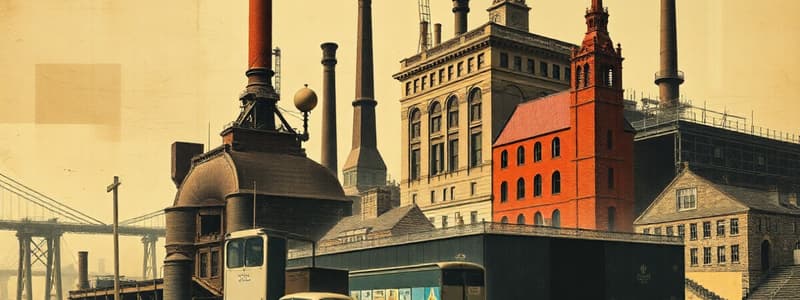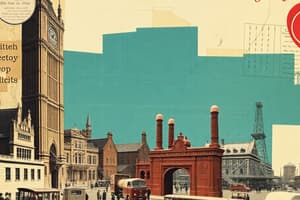Podcast
Questions and Answers
What significant factor contributed to the economic growth during the Industrial Revolution in the UK?
What significant factor contributed to the economic growth during the Industrial Revolution in the UK?
- Increase in agricultural productivity
- Rise of monarchies in Europe
- Population growth (correct)
- European colonization
Which innovation is highlighted as a key technological advancement during the Industrial Revolution?
Which innovation is highlighted as a key technological advancement during the Industrial Revolution?
- Internal combustion engine
- Telegraphy
- Electricity generation
- Steam engine (correct)
Which event took place in 1851 and showcased technological advancements throughout the empire?
Which event took place in 1851 and showcased technological advancements throughout the empire?
- The establishment of trade unions
- The rise of child labor laws
- The Great Exhibition (correct)
- The Chartist movement
What nickname was given to the British government under Queen Victoria due to its global influence?
What nickname was given to the British government under Queen Victoria due to its global influence?
What was one major social consequence of the Industrial Revolution in the UK?
What was one major social consequence of the Industrial Revolution in the UK?
During Queen Victoria's reign, what was her role in relation to the British monarchy?
During Queen Victoria's reign, what was her role in relation to the British monarchy?
What was a key achievements of Clement Attlee during the postwar period?
What was a key achievements of Clement Attlee during the postwar period?
What was a key feature of Victorian society related to economic development?
What was a key feature of Victorian society related to economic development?
What was the relationship between the British Parliament and monarchy during Queen Victoria's time?
What was the relationship between the British Parliament and monarchy during Queen Victoria's time?
What does devolution refer to in the context of the UK?
What does devolution refer to in the context of the UK?
Which motto is commonly associated with Queen Elizabeth II?
Which motto is commonly associated with Queen Elizabeth II?
What major event occurred during Margaret Thatcher's tenure as Prime Minister?
What major event occurred during Margaret Thatcher's tenure as Prime Minister?
Which societal issue was NOT addressed by the Beveridge Report?
Which societal issue was NOT addressed by the Beveridge Report?
How did Thatcher's policies primarily influence the economic landscape of the UK?
How did Thatcher's policies primarily influence the economic landscape of the UK?
What was one of the outcomes of the welfare state introduced after World War II?
What was one of the outcomes of the welfare state introduced after World War II?
Which of the following statements about Queen Elizabeth II's reign is true?
Which of the following statements about Queen Elizabeth II's reign is true?
Flashcards
Industrial Revolution's Impact
Industrial Revolution's Impact
The Industrial Revolution significantly changed UK society, leading to urbanization, industrial growth, and global economic dominance, but also created stark social inequalities.
Victorian Era
Victorian Era
The period of Queen Victoria's reign (1837-1901), marked by industrial growth, social changes, and the UK's global prominence.
Key Factors of IR
Key Factors of IR
Scientific advancements, population growth, and economic developments in the UK were crucial to the onset of the Industrial Revolution.
UK as 'Workshop of the World'
UK as 'Workshop of the World'
Signup and view all the flashcards
Political Stability (1837)
Political Stability (1837)
Signup and view all the flashcards
Steam Engine's Impact
Steam Engine's Impact
Signup and view all the flashcards
Parliamentary Monarchy
Parliamentary Monarchy
Signup and view all the flashcards
Queen Victoria's Symbolism
Queen Victoria's Symbolism
Signup and view all the flashcards
Elizabeth II's Reign
Elizabeth II's Reign
Signup and view all the flashcards
Welfare State
Welfare State
Signup and view all the flashcards
Beveridge Report
Beveridge Report
Signup and view all the flashcards
Clement Attlee
Clement Attlee
Signup and view all the flashcards
Devolution
Devolution
Signup and view all the flashcards
Thatcherism
Thatcherism
Signup and view all the flashcards
Margaret Thatcher
Margaret Thatcher
Signup and view all the flashcards
Study Notes
Industrial Revolution and its Impact on UK Society
- The Industrial Revolution (IR) was driven by scientific advancements, population growth, and economic development in the UK.
- Political stability, a supportive government structure promoting trade, and rising population demand fueled economic growth.
- The steam engine was instrumental in accelerating industrial development.
- The UK became a global economic powerhouse, signified by Queen Victoria’s reign as Empress of India and the era's moniker "The Empire on which the sun never sets."
Victorian Society (1837-1901)
- Queen Victoria's reign (1837-1901), the longest in British history, ushered in an era of peace and prosperity.
- She represented stability during a period of immense societal change.
- Victoria symbolized the UK's growing global dominance and its role as "the workshop of the world."
- The Great Exhibition of 1851 highlighted the UK's technological advancements.
- The repression of the Chartist movement in 1848 illustrates social tensions during industrial progress.
Technological and Industrial Advancements
- Industrial advancements included new energy sources, technologies, and transportation systems such as the steam train.
- Key industries expanding during this period included coal mining, farming, textiles, and transportation.
- Migration from rural areas to cities surged due to industrial opportunities.
- Harsh working conditions, including child labor, characterized this period alongside the rise of trade unions and the Labour Party.
The British Monarchy: An Overview
- The UK operates under a parliamentary monarchy, sharing power between the monarch and parliament.
- The monarch primarily embodies stability, while the prime minister has significant executive power.
- Elizabeth II (1926-2022) embodied stability and modernisation during her 70 year reign. She broke Queen Victoria's record as longest reigning monarch.
- Parliamentary traditions, such as the monarch opening Parliament with speeches drafted by the prime minister, remain central to British governance.
Postwar Period and the Welfare State
- The UK faced significant challenges after World War II, including destruction, bankruptcy, and societal needs.
- Winston Churchill and Clement Atlee led the coalition government to rebuild the country and establish post war social systems.
- Clement Attlee's Labour Party introduced the welfare state as outlined in the Beveridge Report (1942).
- The report addressed five key societal issues: idleness, ignorance, squalor, want, and disease. The NHS (National Health Service) was a key outcome of that period.
- These initiatives improved living conditions and welfare.
Devolution and the Celtic Fringe
- Devolution transferred power from the central UK government to Scotland, Wales, and Northern Ireland, aiming to improve inter-nation relationships.
- Acts of Union (1536, 1603, 1801) marked past unionizations of territories.
- Ireland gained independence in 1921, leaving Northern Ireland as part of the UK.
Thatcherism (1979-1990)
- Margaret Thatcher's right-wing policies (Thatcherism), focused on privatization and reduced state intervention, substantially reshaped the UK.
- Her policies prioritized individualism and free enterprise.
- Key economic changes like privatization and the decline in union influence characterize Thatcher's reign.
- The period was marked by notable events such as the Falkland War and the conflict in Northern Ireland, raising the issue of social division.
Studying That Suits You
Use AI to generate personalized quizzes and flashcards to suit your learning preferences.



